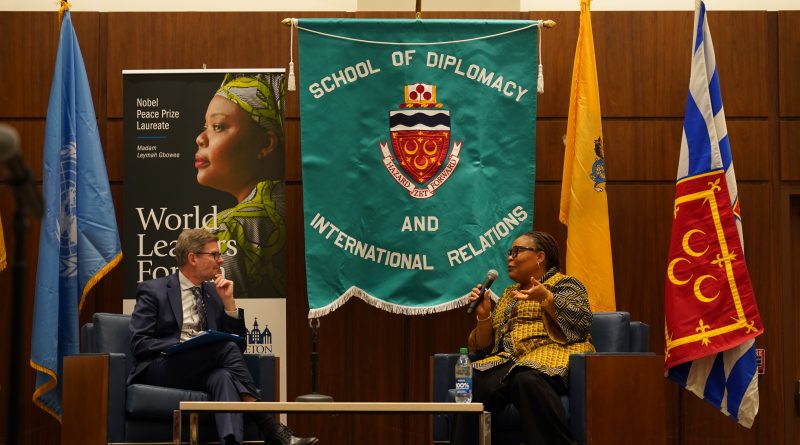Noble Peace Laureate Leymah Gbowee Visits Seton Hall’s World Leaders Forum
Karissa Kromminga
Staff Writer
On November 14, Seton Hall University’s School of Diplomacy and International Relations hosted Nobel Peace Prize Laureate Leymah Gbowee during its World Leaders Forum. The School of Diplomacy hosts these forums to foster dialogue with distinguished visitors concerning critical global concerns. This year’s forum focused on Gbowee’s views on building peace, grassroots movements, and the importance of including women in the geopolitical sphere.
Madam Leymah Gbowee received the Nobel Peace Prize in 2011 and is best known for leading a coalition of Christian and Muslim women in a weeks-long nonviolent protest known as the Women of Liberia Mass Action for Peace. This protest played a key role in ending Liberia’s fourteen-year civil war in 2003. She then co-founded and served as Executive Director for the Women Peace and Security Network Africa in Accra before founding the Gbowee Peace Foundation in 2012. Madam Gbowee is a strong advocate for the inclusion of women in geopolitical affairs, peacebuilding, and security.
The forum began with introductory remarks from Dean Courtney Smith, Interim President Katia Passerini, and School of Diplomacy Board Member Gail Thornton. Madam Gbowee began her speech by acknowledging broad challenges facing the world today, identifying that good leaders “show up first and leave last.”
Madam Gbowee opened her speech by telling the story of a woman she met while protesting in Liberia who had lost both her sons in the Liberian civil wars and joined the protest so that others would not lose their sons. Gbowee explained that this woman and her story became one of her major motivations to keep fighting for a more peaceful world. She then explained that there is a lack of compassion and discourse in the world that makes working towards peace more difficult. The entire world has become militarized, she explained, to a point where war no longer has limits.
Madam Gbowee’s main argument was related to the importance of maintaining acknowledgement of the humanity shared by everyone in the word, even one’s enemies. As she told the audience, “In order for us to make the peace that we needed, we needed to see the humanity of each other.” A lack of recognition of others’ humanity and connection to others within conflict makes it easier to enact violence.
She witnessed this exact struggle when she recently visited Israel to help a group of women protesting the current conflict in Israel. As world leaders and governments pushed for militarism, the women pushed for dialogue and compassion.
“They were determined, or they are determined, that peace is the only way,” said Gbowee. “But as part of finding the path to peace is understanding that we are one people regardless of how we see ourselves, or which nationality we see ourselves with.”
Gbowee further explained that finding peace is not determined by what side individuals are on, but is fostered through everyone being on the side of humanity. This is true not just in Israel and Palestine, but everywhere that there has been war. Ensuring peace means creating a future for the next generation, one in which recognition of the humanity of others is the paramount feature that shapes the world order.
The forum concluded with a questioning period. When asked how to ensure peace before conflict starts, Gbowee responded by explaining that peace begins within each community, through citizens and governments ensuring that people have what they need so they do not feel like violence is the only option. Her story emphasized the need for connection, compassion, and humanity in the journey to bring forth peace within the world.

